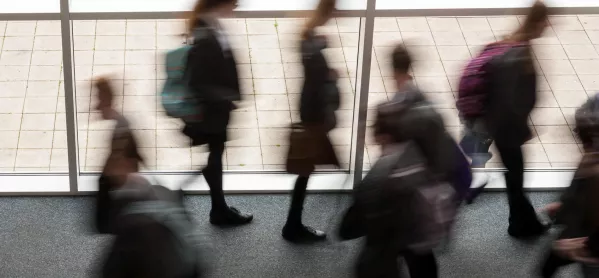Giving pupils time out to write about the things that are important to them can improve the maths performance of disadvantaged pupils by giving them a psychological boost, new research suggests.
In the study, published in the British Journal of Educational Psychology, more than 500 pupils aged 11-14 were asked to carry out a 20-minute writing exercise three times during the school year.
Social mobility: Gap between rich and poor pupils ‘stagnating’
Opinion: ‘Parenting can bridge the disadvantage gap - the research is clear’
Quick read: Early schooling ‘helps narrow boys’ disadvantage gap’
Half of the pupils were asked to write about something they valued, such as their friends or being independent, and the rest were asked to write about a neutral topic - such as what they had done that morning.
The researchers, from the University of Sussex, the University of Brighton and LSE, found that those who wrote about things they valued did better in end-of-year maths tests than those who carried out the neutral writing exercises. They also found that the rise was almost entirely driven by pupils who were on free school meals, whose results had improved.
The disadvantage ‘stereotype threat’
There was no evidence that the values writing exercise, called values affirmation, had any effect on the maths results of pupils who were not on free school meals.
The researchers said that the values exercise could be helping to tackle “stereotype threat” - the feeling disadvantaged pupils may have that they are not expected to do well simply because they are disadvantaged.
Ian Hadden, of the University of Sussex, who led the study, said: “Stereotype threat can be a surprisingly powerful force. It can stress you out, reduce your sense of control over life and make you lose confidence in yourself.
“This result suggests that in the UK it could be a particularly serious barrier for students from households with lower family incomes.
“Fortunately, values affirmation seems to be a potentially effective antidote to stereotype threat. It seems that by reconnecting more deeply with something important in their life, students who are experiencing stereotype threat can start to see the threat with more perspective and so reduce its damaging effects.”
The study found that pupils on free school meals scored less well in the tests than those not on free school meals.
But the gap in maths scores between free school meal pupils and non-free school meal pupils who had carried out the “values affirmation” writing exercises was 62 per cent smaller than the gap in maths scores between free school meal pupils and those not on free school meals who had carried out the neutral writing exercises.
And the study found that free school meals pupils carrying out the values-writing exercise also reported reduced stress levels. Again this effect was not seen in non-free school meal pupils.
Dr Matt Easterbrook, a lecturer at the University of Sussex, said: “While the result is really promising we need to do more research so that we more fully understand how and for whom the intervention works before we can confidently recommend it to all schools.
“Also, the intervention tackles only the symptoms of a wider social problem - that many people expect students eligible for free school meals to do badly at school not because of their ability, but simply because of their family’s economic circumstances.
“To really reduce the social class achievement gap, we need to work to remove the detrimental stereotypes that disadvantage these students.”
The study, called “Self-affirmation reduces the socioeconomic attainment gap in schools in England”, was carried out by Ian Hadden, Matt Easterbrook, Marlon Nieuwenhuis, Kerry Fox and Paul Dolan.




